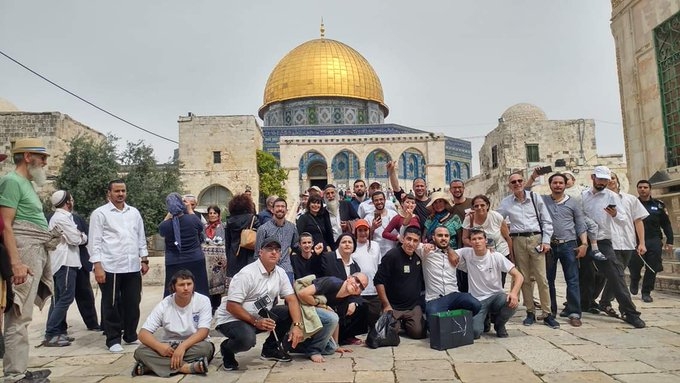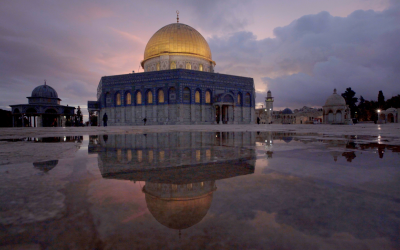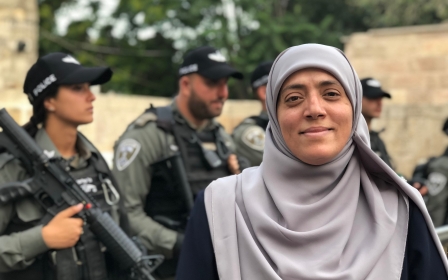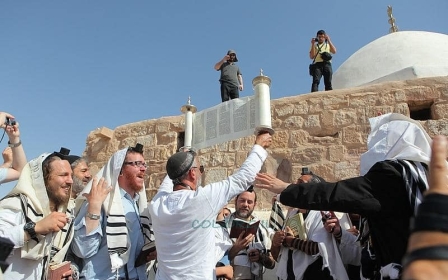Hundreds of Israeli settlers break into Al-Aqsa compound to mark Rosh Hashanah

Guarded by Israeli military police, dozens of Israeli settlers broke into the Al-Aqsa compound for the third consecutive day on Tuesday to mark the Jewish New Year, local media reported.
More than 400 settlers have entered the compound since Sunday, the start of the Rosh Hashanah celebrations, which ends on Tuesday evening.
Uri Ariel, Israel’s agriculture and rural development minister, and Yehuda Glick, a Likud MK, were among those who entered.
Both Ariel and Glick have been permanent figures in joining and advocating for settlers to enter Al-Aqsa compound through the Moroccan Gate, which leads to the holy site from the Western Wall plaza in the Old City of Jerusalem.
Five Palestinians were arrested but subsequently released and two were handed letters by Israeli police barring them from the Al-Aqsa compound, Quds News reported.
New MEE newsletter: Jerusalem Dispatch
Sign up to get the latest insights and analysis on Israel-Palestine, alongside Turkey Unpacked and other MEE newsletters
The Islamic Waqf organisation that administers the site warned in statements of “settlers’ provocations”, and of Ariel and Glick's participation.
“We condemn these actions that guide the region and the world to the unknown,” the Waqf said.
The organisation added that the Israeli police protecting the settlers had turned Al-Aqsa “into a military zone”, turning a blind eye to settler attempts to break into the compound while locking Palestinians out and seizing their identity cards at the gates.
'We will stay, and you will demise'
Hanadi Halawani and Khadija Khweis, two prominent Palestinian activists, were handed letters barring them from entering the compound, one of the holiest sites in Islam.
Khweis said in a video on social media that she was barred from entry for another six months, and that she had not stepped into the compound for a year.
Halawani was also barred for six months. She asked the Israeli officer to add her statement into the official document barring her from access, according to a video published by Quds News.
“The last barring was a whole year. I asked him to write [in the letter] ‘the occupation will demise, and we will stay, and you will demise, with the permission of Allah. Al-Aqsa is our mosque, not your temple',” Halawani said.
Elsewhere, in front of Palestinian worshippers, the Israeli army closed down the historic Ibrahimi Mosque in the city of Hebron in the occupied West Bank's south, as Rosh Hashanah got underway on Sunday.
Condemning "the provocations," the Palestinian Authority’s Waqf ministry called on Palestinians in the city to go and pray in the mosque.
Conflict over Al-Aqsa
Israeli settlers regularly enter the Al-Aqsa mosque compound, and often illicitly perform prayers on the site, where they believe the Second Jewish Temple once stood.
Some right-wing Israeli activists like Glik have advocated for the destruction of the compound to make way for a Third Jewish Temple.
The activists have repeatedly sought to build support for an increased Jewish presence at the site, despite a longstanding, joint guardianship agreement between Israel and Jordan, which retains control over Christian and Muslim holy sites in Jerusalem.
Al-Aqsa mosque is one of the holiest sites in Islam. It was also Islam's first Qibla, the direction towards which Muslims must turn to pray, before that was changed to Mecca, in Saudi Arabia.
Palestinians fear settler tours inside Al-Aqsa compound may erode their claims to the area, and further extinguish their aspirations for full rights and a state of their own, with occupied East Jerusalem as its capital.
Middle East Eye delivers independent and unrivalled coverage and analysis of the Middle East, North Africa and beyond. To learn more about republishing this content and the associated fees, please fill out this form. More about MEE can be found here.





